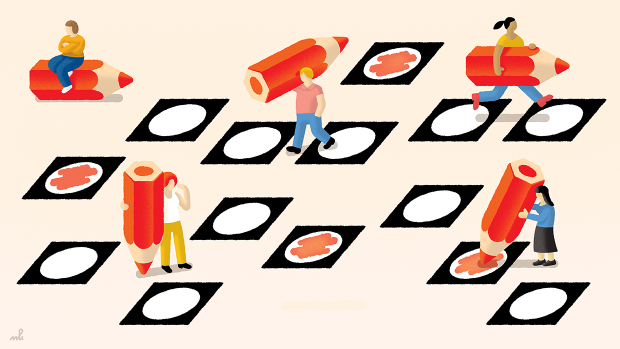
“'You saw that emotions were very important in these elections”
Emotions in politics seem more important than ever. For the left, there’s even huge untapped potential there, says Gijs Schumacher, professor of political psychology. “Rob Jetten put it well: it’s no longer about the themes of the political party, but about whether people feel a positive vibe toward a party.”
Professor Gijs Schumacher researches the role emotions play in politics. This summer, he was appointed professor of political psychology at the University of Amsterdam. How does he view the election results and the political campaigns of the past few weeks?
The day after the elections. What was the first feeling you woke up with?
(Pauses thoughtfully) “You can see that certain trends continue. The left is smaller again, radical right is about the same size. There is still enormous fragmentation. A huge number of people voted blank or spoiled their ballots, which in total could have accounted for a seat. Electoral support is extremely fragile. If the campaign, so to speak, had lasted three weeks longer, the results could easily have swung the other way, for example with Yesilgöz winning. So yes, above all, it’s a feeling of fragmentation that continues.”

You were recently appointed professor of Political Psychology. You research, among other things, the role of emotions in politics. With these elections, your expertise seems perfectly timed.
“You could see that emotions were very important in this election. There’s a large group of voters who float between several parties, willing to make their choice at the last moment and even switch. In such a campaign, you can really see how crucial candidate presentation is. Rob Jetten put it very well: it’s no longer the themes of the political parties that matter, but whether people feel a positive vibe toward a party. My research shows that positive emotions work better than neutral or negative ones. D66 executed this very well. Jetten appeared relaxed, laughed a lot, made jokes. It was very carefully thought out and well executed.”
How does the PVV fit into this story? That party seems to rely on negative emotions.
“We often underestimate the positive aspects of PVV campaigns. Look at the previous elections, where Wilders was presented as ‘milders’. In 2010, their election program was called ‘the agenda of hope and optimism.’ Wilders makes a lot of jokes and laughs frequently. One of his strengths is his humor. That makes a difference. My research also shows that right-wing voters prefer positive emotions—in facial expressions and word choice. Negative emotions are indeed more popular on the right than on the left, but even on the right, there’s still a preference for positive emotions.”
How do you explain the continued strong performance of a populist party like the PVV?
“Populism is a mix of anti-establishment sentiment and appeals that the people should come first. The first aspect, especially, has a strong mobilizing effect. There’s a strange twist in the fact that the left is seen as the establishment, even though they are currently tiny and haven’t been in government for years. Left-wing politicians rarely use anti-establishment rhetoric in their campaigns, even though there’s enormous potential there—but it would need to take a different form, a different ‘enemy,’ for example, targeting big capital.”
“Specifically for the radical right, it’s the combination of populism with anti-immigration positions. This appeals to a different group—it’s more an ideological route. Public opinion on immigration hasn’t changed much over the years in the Netherlands, but the parties position themselves differently. In the ’90s, economic issues were more central; now, it’s migration.”
How important are emotions in the formation process?
“Extremely important. Emotions are also stored in people’s memories, including emotional memories of specific individuals. So the relationships between politicians matter. The bond between Timmermans and Yesilgöz was very poor—they clearly disliked each other. Now that Timmermans has stepped down, the dynamics change. Jetten, as far as I can see, has a fairly good relationship with all the politicians.”
“The most important thing is that politicians shouldn’t feel the need to score points with their own base. That went completely wrong in the previous cabinet with all four leaders. The lesson we can take from that is that people ultimately want a stable government without all that fuss. If you go to the media to complain about every little thing, it makes the cabinet’s legitimacy very complicated.”
Do emotions play a bigger role now than in the past?
“No, they’ve always played a role, but perhaps a different one. The role of identity is one example. Identities are closely tied to emotional memories: how and what you remember partly shapes who you are. That was true in the past as well. During the pillarization era, identities were so strongly anchored that people rarely changed their vote. Emotions have always played a role, but in different ways. Today, identification with a single party is weaker, so voters are more fluid. In this context, emotions can be stirred up during election campaigns, which can have a major impact on voting decisions.”
Your research also focuses on how emotions can strengthen democracy. Can you say anything about that yet?
“Emotions are necessary to keep a democracy running. You’re more likely to get hit by a car on the way to the polling station than for your vote to determine the election outcome. So you need motivation to actually go vote, to read party programs, or to engage with what’s happening in the world. Enthusiasm can help with that. At the same time, an excessive dose of fear about a particular threat, like migrants, can be problematic. Fear causes people to focus too much on that one threat at the expense of others that may be equally relevant. My question is: how do we ensure that citizens are well and balanced informed, engaged, willing to run for office, and ready to protest? But I don’t have an answer yet, haha!”


